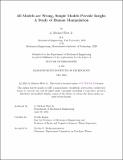All Models are Wrong, Simple Models Provide Insight: A Study of Human Manipulation
Author(s)
West Jr., A. Michael
DownloadThesis PDF (15.29Mb)
Advisor
Hogan, Neville
Terms of use
Metadata
Show full item recordAbstract
Humans possess a unique ability to manipulate tools, facilitated by the dexterity of our hands. Unfortunately, millions lose this capability annually due to conditions like limb amputation or Cerebral Vascular Accident. Robotic rehabilitation technologies, including prosthetics and exoskeletons, aim to restore motor function. However, understanding human control strategies is crucial for effective implementation. Unfortunately, studying humans is challenging due to their inherent complexity. Simple models can help untangle this complexity. This thesis delves into the role of simple models in analyzing human neural motor control and perception through the study of upper-limb motor control and hand manipulation. Specifically, this thesis aims to develop a descriptive understanding of human manipulation in unimpaired subjects. To achieve this, we first delve into a common simplification of human hand manipulation—the presence of kinematic hand synergies—and stress the importance of studying functional hand manipulation beyond simple grasping. Secondly, we present findings from a motor control study that introduces a simple mathematical model, emphasizing mechanical impedance, that competently describes how humans manage physical interaction. Thirdly, we underscore the significance of mechanical impedance through a perceptual study which highlighted humans’ robust ability to perceive limb stiffness. Lastly, we introduce a metric that can objectively quantifying manipulation complexity, potentially broadening researchers’ scope in studying human complex manipulation. The insights gained from this work have far-reaching implications, potentially enhancing existing robotic and rehabilitation technologies and guiding the development of new ones. In a field dominated by large complex models fed by big data, this thesis highlights the value of conducting the basic science research required to uncover aspects of human motor control. A video presentation of this thesis can be found at: https://www.youtube.com/watch?v=u2eCJHqEGww
Date issued
2024-05Department
Massachusetts Institute of Technology. Department of Mechanical EngineeringPublisher
Massachusetts Institute of Technology